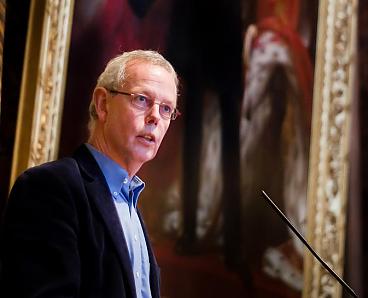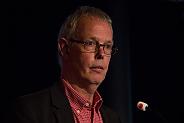Kox: Rutte’s government is leaving a divided society in its wake
Kox: Rutte’s government is leaving a divided society in its wake

Each year after the government has presented its programme for the coming period, which in this case will end in March with the general election, parties in both houses of the Netherlands’ Parliament present and debate their response. Today was the turn of the upper house, with SP Senate leader Tiny Kox launching a blistering attack on the government’s record.
With the election approaching Kox spent some time on domestic matters before dealing with those international issues which most concern Dutch voters: the European Union, the refugee issue, and war in the Middle East.
“Hundreds of thousands of Dutch people have lost their jobs,” he said, “because the government has acted too harshly in reducing costs…economic growth is lagging. And yet we have just as many people without work as when this government took office.”
Kox said that for many people “the connection between themselves and us in The Hague broken. Political involvement is, for them, no longer seen as a means to bring about change and improvement but rather as a waste of time.”
The blame for this could be placed on “the ideological wind which has been blowing through our society for a good quarter-century,” the ideology of neoliberalism, of every man and woman for themselves. The result was the loss of cooperation and solidarity, “a society in which profit comes before wellbeing, marketisation prevails and cooperation is written off, in which health care, education, environment, nature and culture are seen as drains on resources rather than foundations of a sustainable society. Why should you behave like a responsible citizen when politics treats you like a calculating consumer and makes laws which virtually force you to put your own interests first?”
Government claims to have led the Netherlands out of the crisis were based on what the 19th Century British Prime Minister Benjamin Disraeli famously called ‘lies, damned lies and statistics.’ Debt, poverty, including amongst children, and the destruction of the public sector provide evidence to the contrary. Lack of investment has caused hundreds of thousands of Dutch workers to lose their jobs unnecessarily. Old people, those with disabilities, students and schoolchildren have all suffered. Permanent jobs are disappearing. Meanwhile, under this government the proportion of wealth owned by the richest 1% has risen from a fifth to a quarter.
Having dealt with a  broad brush with domestic issues, issues which will, however, be familiar to people across Europe, Senator Kox turned his attention to Brussels and the European Union. “In recent years this government, against the wishes of a large section of the population, has trotted happily along at the heel of the European Commission. Our government has been Europe’s fool.” Referring to the two governing coalition parties, the centre-right VVD and the centre-left Labour Party, he said that they bore a heavy responsibility for the erosion of belief in European cooperation. What was once a beacon for peace, security and progress had now been converted by the European Commission into the world’s most competitive market, in conflict with other global players, if possible through far-reaching free trade treaties, if necessary via a race to the bottom, tough economic sanctions, underhand tax constructions, and soon probably even with its own army. How far all of this is from what was proposed here in The Hague in 1948, during the famous congress which bears the city’s name, by what was then the cream of European politics. They dared to make inspiring plans for fair European cooperation, to prevent renewed war and in the whole of Europe protect human rights and promote economic and social progress. Now the opposite is happening, and, Kox said, “I find that very sad.
broad brush with domestic issues, issues which will, however, be familiar to people across Europe, Senator Kox turned his attention to Brussels and the European Union. “In recent years this government, against the wishes of a large section of the population, has trotted happily along at the heel of the European Commission. Our government has been Europe’s fool.” Referring to the two governing coalition parties, the centre-right VVD and the centre-left Labour Party, he said that they bore a heavy responsibility for the erosion of belief in European cooperation. What was once a beacon for peace, security and progress had now been converted by the European Commission into the world’s most competitive market, in conflict with other global players, if possible through far-reaching free trade treaties, if necessary via a race to the bottom, tough economic sanctions, underhand tax constructions, and soon probably even with its own army. How far all of this is from what was proposed here in The Hague in 1948, during the famous congress which bears the city’s name, by what was then the cream of European politics. They dared to make inspiring plans for fair European cooperation, to prevent renewed war and in the whole of Europe protect human rights and promote economic and social progress. Now the opposite is happening, and, Kox said, “I find that very sad.
“I have received – as many of us have – an invitation to a celebration of twenty-five years of the Maastricht Treaty. I’m always happy to party, but here there is nothing to celebrate. In Maastricht European cooperation took a completely wrong turn. Continuing along the wrong path is taking us further and further from home. If we want to rescue European cooperation, then we have to change that, With less Brussels and more national control, and above all greater involvement of our country’s citizens. I believe that this is possible, but we haven’t much time left, now that across Europe xenophobic nationalism presents itself shamelessly as an attractive prospect.
“I’m looking at the call from our Premier to all of us in the matter of the Ukraine Association Agreement. He wants, due to the ‘national interest’, to say YES when the people have said NO. What for him prior to the referendum was simply a benefit to trade, he now suddenly calls geopolitical in nature and bigger than the Netherlands. Before the referendum the Prime Minister laughed in his usual way at Jean-Claude Juncker’s doom-mongering, but now he surpasses even Juncker’s threat, saying this could be the end of European unity.”
Addressing the Prime Minister directly, Kox accused him of being dishonest. Nobody in either the Netherlands or Ukraine gained a thing from this, and European cooperation towards peace and security benefited not at all. “I assume.” Kox continued, “that the prime minister has taken note of the summary of assets of Ukrainian politicians and administrators made public on Sunday and the land, buildings, companies, dollars, euros, Rolex watches and other luxury knick-knacks that this includes. They are swimming in money, money that doesn’t come from their salaries, while the people languish in poverty. 30% of the people want to leave. While the country bleeds to death economically and the civil war continues, the politicians stuff their pockets and oligarchs plunder freely. Those who that three years ago in Maidan Square and elsewhere in the country fought against endemic corruption, have again been treated with contempt.”
Turning to the issues raised by the influx of refugees into Europe and the Netherlands itself, Kox ridiculed the far right PVV for calling for the construction of a fence around the country. There was, he pointed out, already effectively a fence, not where the PVV wanted it “between the Zwin and the Vaalserberg”, but along the external borders of the European Union. “The refugees are staying far away from here, and the government speaks of a success. But the Mediterranean Sea, which has played a leading role in the history of our civilisation, has become a graveyard in which people are drowning every day while seeking a modest share in the abundant fruits of that civilisation. We can take pleasure in the fact that natural disasters such as the earthquake in Italy create relatively few victims, but we should be deeply ashamed that this year, this other, man-made disaster, has already caused the deaths by drowning of 3740 people in the Mediterranean Sea.
“In exchange for billions Turkey is currently allowing virtually no refugees to cross into EU countries. This too the government terms a success. Yet our government, together with the European Union, is apparently so afraid that President Erdogan will foreswear the refugee deal that they continue to avert their eyes from this same Turkey, the Turkey which has shamefully misused a failed coup-d’état. Misused in order to fire tens of thousands of civil servants and teachers, ban television channels and newspapers, bomb its Kurdish population, arrest journalists and remove MPs’ parliamentary immunity. What, I would like to ask the Prime Minister, have the inhabitants of Turkey done to us that we should now simply leave them to their fate? When,” asked Senator Kox, who is chair of the United Left Group in the Parliamentary Assembly of the Council of Europe, “is the government going to call Turkey resolutely to account to observe its obligations as a member of the Council of Europe and signatory to the binding European Convention on Human Rights?
“Wars ,” continued Kox, “are the best way to produce refugees. We are involved, either directly or through our allies, in many wars which are driving people from their homes. In this we are limiting the possibilities available to better deploy diplomatic skills. That’s a crying shame. The Netherlands is better and stronger as a peacemaker than as a party to war. That’s why we make the top priority in our foreign policy our constitutional obligation to promote the international rule of law. Instead of going along with the construction of a new Cold War, we should be directing all our force towards the restoration of normal international relations.”
- See also:
- Dutch elections
